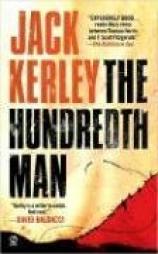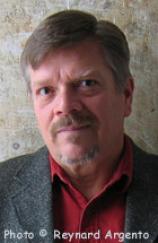Interview: June 11, 2004
June 11, 2004
Jack Kerley, author of THE HUNDREDTH MAN, talks to Bookreporter.com's Suspense/Thriller Author Spotlight Team (Carol Fitzgerald, Joe Hartlaub and Wiley Saichek). In this interview Kerley explains his fascination with the human psyche and a friend's struggle with mental illness that heavily influenced his book. He also discusses living in and writing about the South, and his unlikely, almost fairy-tale introduction to the world of publishing.
BRC: What nightmare was your inspiration for THE HUNDREDTH MAN? Seriously, the characters in this book --- a homicide detective, his warped serial killer brother who took the brunt of their father's abuse for him and functions as his de facto advisor (!), an alcoholic forensic doctor --- are fascinating. And those are just the good guys in THE HUNDREDTH MAN! Did you use any real world models or did they spring wholly from your imagination?
JK: When in my late teens, a close friend fell into schizophrenia. The incomprehensibility of his actions, delusions and affectations made a deep impression. Since then I've been fascinated by mental aberrations and their manifestations, and regularly read up on the subject. I've also met some folks who flat-out scared me to the core because I sensed their lack of boundaries. Add imagination and the needs of the story to the mix and you get the breeding ground for many of my characters.
BRC: One of the most interesting aspects of THE HUNDREDTH MAN is your ability to get into the mindsets of Jeremy and "Mr. Cutter." What sort of research did you do in order to achieve the authenticity with which you infused the thought processes of these characters?
JK: This pretty much springs from the above answer. I'll add that, later in life, another friend suffered a debilitating mental illness. While generally benign, her delusions are completely real to her. Creating Jeremy and Mr. Cutter was basically selecting the kind of delusions powering their madness, and imagining the state of mind such delusions would create.
BRC: THE HUNDREDTH MAN is such a great title for this book --- a really perfect way to describe Carson. Right from the opening chapter it gives readers a picture of Carson and how he walks to his own drummer. Did you know this was the title from the start or was that decided later?
JK: I'd just finished my first novel and wanted to start a second. I had no idea what to write about, so I started by putting a character in a morgue and having him tell my favorite joke. After the punch line, I had to figure out how to keep going, so I made another character the butt of the joke, the "hundredth man" who prefers dark to light. I studied the two words, scrolled to page one, typed "The Hundredth Man" in the title position, and that was that.
BRC: You live in Newport, Kentucky, just across the river from Cincinnati, Ohio. Newport used to be a pretty wild place. Are you originally from Newport? Have you ever considered writing a novel set in Newport during its wilder years in the 1950s and 1960s?
JK: I'm a native and long-time resident of Newport, for years known as the "Sin City of the South" owing to mob control, wide-open gambling, and a general smorgasbord of decadence. Though I'm delighted to be from a town with a colorful past, my interests tend toward contemporary manifestations of the shadowy side of human nature. I'm happy to say that Kentucky towns along the Ohio River are renowned for propagating and harboring all manner of human oddities, and I draw from them with glee and abandon.
BRC: Though you live in Newport, you write very authoritatively about Mobile, Alabama in THE HUNDREDTH MAN. Did you live there for any extended period of time? What inspired you to set THE HUNDREDTH MAN in Mobile?
JK: I started visiting Fairhope, Alabama --- on the eastern shore of Mobile Bay --- about a half-dozen years back, when my snowbird parents bought a place in one of the nicest trailer parks you're likely to find. The place is pretty much mine now, and I spend about three months a year in the Fairhope/Mobile area, partly vacationing with my family, partly on "full-immersion" writing jaunts. As for setting THE HUNDREDTH MAN in and around Mobile, I love the heat and fecundity of the Deep South and my stories seem to grow more easily there.
BRC: Like a number of authors of crime fiction, such as James Patterson and Don Bruns, you have an extensive background in the advertising field. What advertising projects have you worked on that might be known to our readers?
JK: Hmmm. If you bought a semi-tractor from International Harvester in the early 80s the salesman probably used my materials to sell it to you. I've sent fliers to your door at the behest of Procter & Gamble. Put words in the mouths of folks hawking LensCrafter's Eyewear. Offered you savings on Nathan's Famous hot dogs. And did work for hundreds of other companies over a twenty-five-year span. A couple days after THE HUNDREDTH MAN sold in Great Britain, I put my advertising portfolio in a big plastic bag and watched the garbage truck consign it to history.
BRC: Your story concerning your breaking into publishing is really interesting. Our understanding is that you won a short story contest that indirectly led to your first novel, THE HUNDREDTH MAN, being published. What exactly happened?
JK: Actually, they were two separate incidents. I wrote a short story on a dare from a friend and entered it in a contest sponsored by Cincinnati's Mercantile Library, first prize being a trip to the Santa Barbara Writer's Conference. I won, and just before leaving for Santa Barbara received great news: Aaron Priest would represent me. Aaron moves fast, and the week I was at the conference he had my manuscript at auction. So there I was, in the glorious Santa Barbara Mountains, surrounded by aspiring and professional writers, as folks from various publishers called to suss me out. The day before flying home I received word the book had sold to Dutton. Suffice to say it was a writer's dream week.
BRC: Have there been any authors, inside of or outside of the crime and mystery genres, who have influenced you?
JK: When I was twelve my father gave me a copy of THE FIRST SAINT OMNIBUS by British mystery writer Leslie Charteris. I consumed the book, rapt in tales of improbable derring-do. Not long after, my father introduced me to the Travis McGee series by John D. MacDonald. From these writers came a lifelong love of the mystery genre. Influences outside the genre include Shakespeare (a necessity), Ken Kesey, whose Big Chief in ONE FLEW OVER THE CUCKOO'S NEST reinforced my fascination with deranged characters, and the poetry of T.S. Eliot, James Dickey and Theodore Roethke.
BRC: What sort of writing schedule do you follow?
JK: An angler's schedule, driven by the sun. I get up well before dawn, write for an hour, then walk eight blocks to the Ohio River to watch the sun come up over the water. I walk for another hour, making notes into a pocket recorder, then return home, have a light breakfast, and write until mid-afternoon. I catch a brief nap, maybe write a bit more. Before bed I review the day's work and figure out what needs doing the next day. I follow the same schedule in Alabama, except the sun rises over Mobile Bay.
BRC: What are you working on now and when can readers expect to see it?
JK: I'm currently well into the second Carson Ryder/Harry Nautilus novel and having a fine time with old friends and new characters. The book will be published by Dutton in Summer 2005.
BRC: And before we end, we understand that you are quite a trout fisherman. Can you share one of your favorite fishing stories with us?
JK: A buddy and I had just finished a day's backwoods trout fishing in the North Carolina highlands and stood roadside at the tailgate of his truck, trading damp clothes for dry and stowing gear. We were rehearsing our fishing lies when a big blue bus wheeled around the bend, its side proclaiming something like, "Laurel Valley Baptist Church." Deep in the rapture of trout-chasing tales, my friend turned to the bus, smiled and waved pleasantly, forgetting he was dressed solely in a porkpie hat and soggy white briefs. About two-dozen elderly ladies stared from the vehicle in gape-mouth horror. None waved back.




